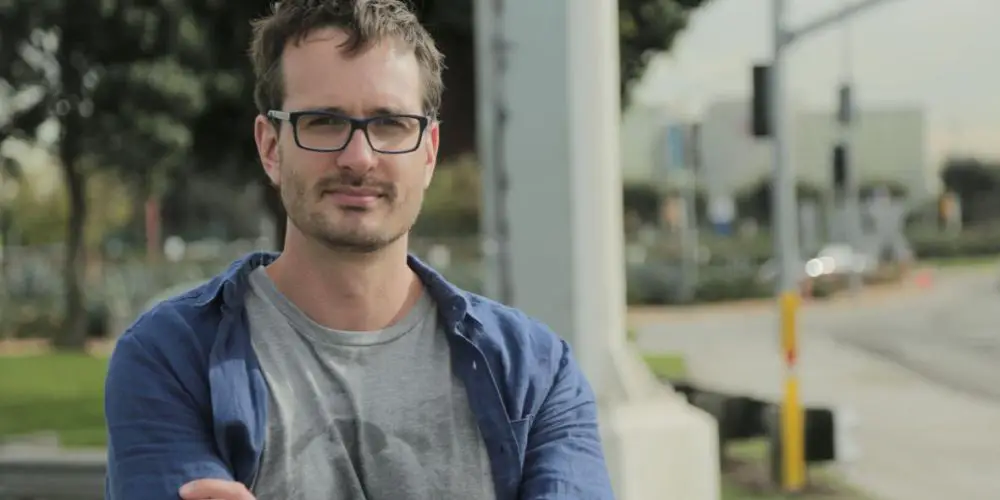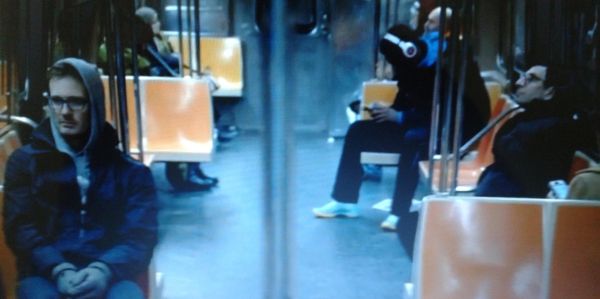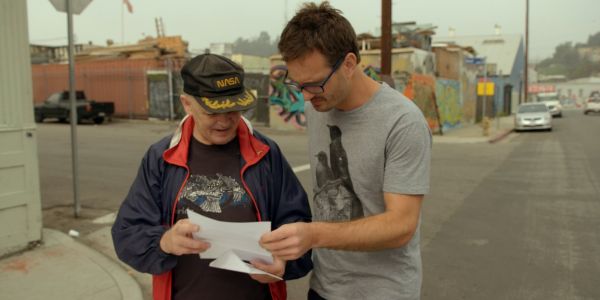Interview with TICKLED Director David Farrier

All articles contributed by people outside of our team are…
After reading about David Farrier and Dylan Reeve’s new documentary Tickled premiering at Sundance, I was immediately intrigued by the subject matter, because it didn’t exactly sound true. But it is, and it’s totally crazy. One search and you’ll find out about the expansive empire of competitive tickling, and the harsh response from one particular tickling organization that sparked the beginning of what this film is about.
The IMDb logline reads: “Journalist David Farrier stumbles upon a mysterious tickling competition online. As he delves deeper he comes up against fierce resistance, but that doesn’t stop him getting to the bottom of a story stranger than fiction.”
Read the Film Inquiry review of Tickled here
A couple weeks later, I read that HBO acquired the U.S. television rights, while Magnolia picked up the North American theatrical rights, which is cool because I got to watch the film in an actual theater. I reached out to Farrier in hopes of asking him some questions about the making of Tickled, and we got set up on a call soon after. This is one of the most interesting documentaries I’ve seen in awhile. It’s such a well-polished film, with an amazingly true story, and with two filmmakers searching for answers in bizarre territory.
Jon Walkup: How are you doing?
David Farrier: It’s been a bit of a mad house but we have a good attorney and everything is okay.
JW: I went and saw the film last night and, I loved it. I got really into it and set the popcorn aside. I put it on the ground.
DF: Oh, wow. Oh, god.
JW: I asked some of the staff at the theater what they thought of Tickled and one of them said it was his favorite and the other said it was the most interesting documentary of this year. I thought that was pretty big.
DF: I’ll take that.

JW: When I looked online at your guy’s Kickstarter, I saw that it was under the titled “The Tickle King.” Was that the original title?
DF: It was our working title back when this was going to be a documentary for Kickstarter. I can’t remember exactly where that name came from but that was our working title.
JW: It’s definitely a cool name for a film.
DF: It a great name, but I think the reason we didn’t call it that was because, inherently, in that title comes a potential spoiler. We wanted people to go into this film as we felt going in, in that it was going to be a light-hearted journey, which is the same journey that Dylan and myself went on that went somewhere a lot darker.
JW: Yeah.
DF: But good. That’s a good question. Haven’t had that before, good work.
JW: Oh, thank you. So, how do you go about pitching a film like this to people, not just online. You’ve got the Jane O’Brien response which was very harsh, but how else do you pitch this film?
DF: It was complicated, when I was pitching in New Zealand to like the film commission and some other people to get extra funding, it was actually a really fun pitch because I was in the middle of it all, so at that point I had a lawyer from New York, and a lawyer from New Zealand writing to me and there was this impending trip of these three gentlemen coming from New York to New Zealand.
So, basically my pitch was there’s a tickling competition happening in LA, you get paid thousands to tickle, all expenses paid, this is this crazy thing, now I’ve reached out to the company, and received a homophobic response, and then I’m now getting legal threats, and now they’re flying people to New Zealand to tell me not to make a film.That’s the film. That’s my pitch.
JW: It’s a very original pitch. I don’t feel like anyone would have an idea like that.
DF: No, and it was wild and I felt bad in a way, because I was pitching for a prize of ten thousand dollars for our post-production, and a lot of the people in the pitch competition had been working on it for months, and they had power point slides, they had cue cards, and then I just walked in a complete mess in shorts and T-shirt and just spoke about the story.
It was just a really good story, and I ended up winning, and I felt bad for the other people who spent months analyzing every word of their pitch, when I was just in there ranting. You know what I mean?
JW: Yes, I think you were destined to make the film. It’s very rich, the people in it don’t feel like fictional characters, but the way you explore their background allows for the film to feel like a good mystery novel.
DF: Yeah, totally.

JW: How long was the shoot?
DF: We shot for two weeks and then went back and shot for three and half weeks, and that was in America. Then there was the additional pick up shoot where there was computer screens, or just stuff back in New Zealand.
JW: So you had a couple breaks in between to figure out what the next thing was going to be?
DF: Yeah, the first shoot was almost like a research trip in a way. It was going to be a shoot for the documentary but we found out so much that when we came back we identified who are subjects would be in the film, we knew who wouldn’t be a subject in the film, and we knew the rough outline of the story. We put a lot of that into planning of our next shoot, which would be our last, so we had to achieve very specific things.
JW: The decision to co-direct with Dylan Reeve, how did that come about? Was it organic?
DF: Super organic, man. We were lucky in that it worked, and that we both had different skill sets that complemented each other really well. I would advise anyone who goes into co-directing to really analyze why you’re doing that, we didn’t, it could have been a complete disaster.
Also, I should tell you this, Dylan and I weren’t like great friends before this, we were more like internet friends. So, we didn’t even know if we would like each other traveling around America for five to six weeks. We had that added danger but what helped was that we were both being threatened at the same time, and I think that bonded us.
We got lucky in that Dylan would do a bit of field directing, and I would do some field directing, and then I would do all the post directing, because Dylan had to go back to work. I didn’t have to go back to work full time. So, we just really complimented each other in a really fortunate way.
JW: What was the hardest part about directing?
DF: Two things, it was telling a really complicated story in a reasonably clear way, so people could understand what was happening, and finding what to leave out. There were a million interesting facts that we could have thrown into this thing, but if they didn’t help the story, we left them out. You can imagine a story that takes place over the course of twenty years, there’s going to be a lot of interesting things, but if it doesn’t service the story, there is no point.
Secondarily, it was more about the production, making sure we were doing everything correctly and legally, because we we’re dealing with someone who has a lot of money and we had to make sure we didn’t do anything illegal. And so we had to be super careful with any kind of recordings or conversations and that we were moving by the book.

JW: How was the post-production process for you?
DF: Dylan did a lot of the graphics, and technical stuff you see in the film. I focused on the story, moving the story and finding out where it would go. Which was great, because if Dylan and I were in the booth at that point, we would have ended up yelling at each other. (laughs)
But it just naturally worked out. Dylan would look at cuts and have his input, along with our wonderful producer Carthew Neal who was amazing and our editor Simon Coldrick who helped the whole thing come together.
JW: Did you show any cuts to close friends to get notes?
DF: No, I kept it very locked down. I very specifically didn’t want anyone else. In that stage you just want to tell the story that you know, and if you start taking on board other people’s comments early then it’s my belief that you will screw it up. I had people I trusted, like Carthew, Simon, Dylan, and our EP Justin and I did not want to add any other voices that early. Later on we showed it to people and we took on certain advice but in the early days when you’re still building a story, there’s a specific amount of people allowed to give input.
JW: One thing I like about the film is that it doesn’t move too fast, and it moves at its own pace. What I noticed at twenty-five minutes into the film things had escalated and Dylan and yourself were making the big decision to keep pursuing and then your voice over comes back in and says something like “I can’t believe this is all over tickling.” It was a nice reminder that hardly anytime had passed in the film yet things were already strangely serious. Do you have anything to say about the pacing of the film?
DF: We were fortunate in that things just happened and it was great. It was difficult though to pace things out. It came out at the right length and at the right tone. What we added in the edit was space. We didn’t want to just come at the audience with facts continuously, but taking the time to breath, especially between different locations because you’re taking in a lot of information and so we just had to make sure we had some nice quiet spaces in the film.
But, with the pace we just tried to mimic what happened to us in real time, and tried not to make things go too long. If there had been an interview happening for a long time we needed to have a scene happening. It was just balancing the interviews for the reality of what we were shooting, with our own road trip around America and trying to make that stuff paced in a logical way.
JW: Well, thank you for talking with me. I think you’ve made a really great film, and I’m excited to see it gather more attention as it moves along.
DF: Thanks, Jon. I hope so too, we’re rolling it out, and hopefully more people go and see it, and we can keep it out for longer.
Interview was conducted by Jon Walkup, you can find him on Twitter and Instagram, and his website, beardedyouthproductions.com.
Does content like this matter to you?
Become a Member and support film journalism. Unlock access to all of Film Inquiry`s great articles. Join a community of like-minded readers who are passionate about cinema - get access to our private members Network, give back to independent filmmakers, and more.
All articles contributed by people outside of our team are published through our editorial staff account.












